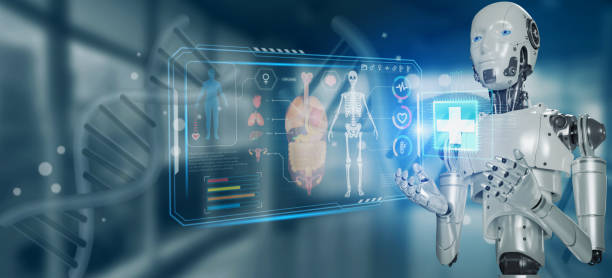Table of Contents
A new era of healthcare innovation is being ushered in by the fusion of cutting-edge AI technologies with conventional healing techniques.
1. Historical Evolution of Medical Practices
Herbal remedies, acupuncture, and other conventional techniques were employed to treat illnesses by ancient societies such as Egypt, China, and Greece. The &8220;Father of Medicine,&8221; Hippocrates, established the principles of contemporary healthcare ethics. The emphasis of Traditional Chinese Medicine and Ayurvedic practices is on holistic wellness and balance. These age-old techniques continue to have therapeutic value despite contemporary developments, providing comprehensive healing approaches that medications frequently cannot. A more thorough approach to healthcare is provided by combining these customs with contemporary methods.
2. The Role of AI in Modern Medicine
By increasing the precision of diagnosis and the effectiveness of treatment, artificial intelligence (AI) has completely transformed medicine. Doctors can quickly and accurately analyze complex data with the aid of AI applications like machine learning and natural language processing. Retinal disorders and cancers can be identified more quickly and accurately by AI algorithms. Predictive models driven by AI allow for early intervention, treatment personalization, and better patient outcomes. Doctors can concentrate on patient care by using AI-driven virtual assistants to handle repetitive tasks.
3. Integrating Traditional and Modern Approaches
It&8217;s an exciting and promising endeavor to combine cutting-edge AI advancements with traditional medical practices. Practitioners can more successfully validate and incorporate traditional methods into modern practice by utilizing AI&8217;s analytical capabilities. For instance, the pharmacological characteristics and possible uses of herbal compounds used in traditional Chinese medicine can be discovered by machine learning algorithms. This integration creates new avenues for the development of efficacious treatments in addition to validating long-standing practices. AI can also assist in customizing holistic treatment plans. AI can recommend particular traditional practices that may be advantageous for individual patients by evaluating patient data, guaranteeing a more individualized approach to healthcare. A more thorough and efficient healthcare system is promised as a result of this blending of traditional and modern ideas.
4. Data-Driven Personalized Medicine
By carefully examining enormous volumes of patient data to create customized treatment regimens, AI is opening the door for personalized medicine. A thorough patient profile is produced by synthesizing data from lifestyle choices, genetic information, electronic health records, and even social determinants of health. AI can forecast which treatments will work best for each person thanks to this holistic viewpoint, which improves recovery rates and general health outcomes. Additionally, ongoing data monitoring makes it possible to modify treatment plans in real time, guaranteeing that they continue to be the best as patient conditions change. With the help of AI technologies, personalized medicine departs from the one-size-fits-all approach and provides each patient with precise, individually tailored care.
5. Enhancing Diagnostic Accuracy with AI
The most significant impact of AI is in increasing diagnostic accuracy. Conventional diagnostic techniques can be laborious and prone to human error. However, AI algorithms are able to process enormous volumes of data in a matter of seconds, spotting anomalies and patterns that the human eye might miss. AI systems, for instance, can analyze thousands of X-rays or MRI scans in radiology in a fraction of the time it would take a human, and they can identify abnormalities with remarkably high accuracy. This feature guarantees that patients receive timely and accurate information, which is essential for efficient treatment planning, and drastically lowers the possibility of misdiagnosis. The improved diagnostic procedure changes the diagnostic landscape and improves patient outcomes.
6. Revolutionizing Disease Prevention
AI&8217;s potential to predict and prevent disease has broad ramifications, as prevention is always preferable to cure. AI can detect people who are at high risk for particular conditions long before symptoms show up by examining genetic data, environmental variables, and lifestyle decisions. Early interventions that can stop the onset of disease or lessen its effects are made possible by this predictive power. By evaluating a mix of genetic information and lifestyle factors, AI, for example, can detect early indicators of heart disease, allowing medical professionals to suggest medication or lifestyle modifications before serious health problems develop. In addition to improving individual health outcomes, this proactive approach lessens the overall strain on healthcare systems.

7. Ethical Considerations in AI Integration
Although AI has many positive effects on healthcare, there are also important ethical issues that need to be resolved. Data privacy is one of the main issues. To preserve patient confidentiality, the enormous volumes of personal health data needed for AI to work properly must be safely stored and handled. And there&8217;s the accountability issue. Clear guidelines must be established regarding who is in charge of making decisions made by AI systems—technologists, healthcare providers, or both—because these decisions have the potential to have a substantial impact on patient health. Furthermore, there is a chance that AI systems will reinforce preexisting biases in the data because they frequently rely on it. Efforts must be made to guarantee that AI helps provide everyone with fair and equal healthcare.
8. The Future of AI in Medicine
AI in medicine has a very bright future ahead of it, with potential breakthroughs that could completely transform healthcare. The creation of AI-driven robotic surgery is one such development that attempts to improve surgical accuracy and success rates while reducing recovery times. AI also has the potential to improve telemedicine, enabling people in underserved or remote areas to receive high-quality medical care. Novel AI applications that enhance current medical treatments and uncover new ones will probably continue to be unveiled by ongoing research and development. AI will surely be essential to the advancement of medicine, the development of more individualized, precise, and efficient treatments, and the eventual improvement of global healthcare outcomes as it develops further.
